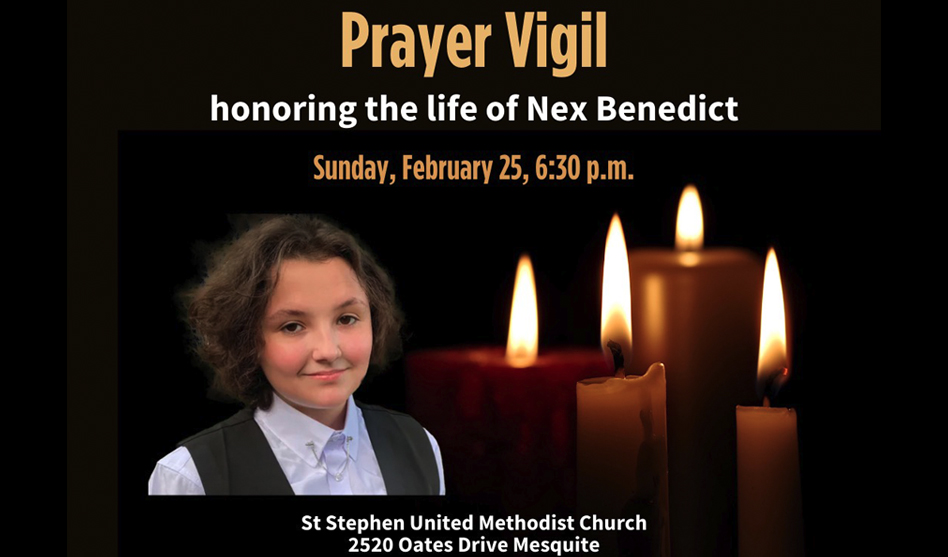
St. Stephen United Methodist Church, 2520 Oates Drive in Mesquite, will hold a community candlelight prayer vigil, Sunday, Feb. 25, at 6:30 p.m., honoring the life of Nex Benedict, the Owasso, Okla., student who died Feb. 8 after having been beaten by other students in a bathroom at Owasso High School. Nex’s mother has said Nex had been subjected to bullying at school for some time.
This Dallas-area prayer vigil is being held as an act of solidarity with Nex’s family and home community, which will be holding a prayer vigil at the same time.
“Our non-binary and transgender children face increasing danger because of invasive actions by people they were taught to trust to promote community welfare and protect the most vulnerable,” said the Rev. Geoffrey C. Moore, Ph.D., St. Stephen’s lead pastor. “Instead, elected officials have put them at grave risk for bullying, persecution and, as we’ve now seen, violence.
“We stand in solidarity with Nex’s family, the community of Owasso and non-binary and transgender Oklahomans everywhere, as well as with non-binary and transgender children in our own communities. We’re holding this vigil to spread light in this darkness,” Moore added.
Nex, 16, was a non-binary Indigenous sophomore at Owasso High. The mother of Nex’s friend, who was reportedly also beaten in the assault, said that the attackers — three older female students — repeatedly beat Nex’s head against the floor, and that Nex was unable to walk to the nurse’s office on their own.
School officials there have disputed reports that the adult — reportedly a teacher — who eventually intervened and stopped the assault failed to engage the school nurse, failed to send Nex to the hospital and failed to inform police of the incident.
In a statement posted to the school’s website, school officials said: “Students were in the restroom for less than two minutes and the physical altercation was broken up by other students who were present in the restroom at the time, along with a staff member who was supervising outside of the restroom.”
Police said that school officials “determined that ambulance service was not required,” but that the school nurse did suggest that Nex “visit a medical facility for further examination.”
Police have said that Nex’s grandmother took them to the hospital later that night and that the grandmother was the one who reported the assault to police.
Nex was released from the hospital the night of Feb. 7 but was rushed back to the hospital the following day, Feb. 8, at which time they were pronounced dead. Police have since said autopsy results “did not indicate that the student died as a result of trauma.” No one has said what the cause of death was, however, and the State Medical Examiner’s Office will determine the final cause and manner of death.
Nex’s death comes in the wake of a wave of anti-LGBTQ legislation passed in Oklahoma as well as anti-LGBTQ policies and comments by the state’s superintendent of public instruction, Ryan Walters. Similar legislation has been passed in Texas, as well, as Texas Attorney General Ken Paxton, under indictment on federal securities fraud charges and under investigation for abuse of power, has used his office to try and access medical records of transgender youth seeking medical care outside the state.
ABOUT ST. STEPHEN UMC
“Founded in 1959 during the Civil Rights era, St. Stephen UMC began challenging oppressive status quo structures from its beginning. In 1964, its founding pastor, the Rev. William K. McElvaney, and a group of lay leaders confronted the Mesquite ISD Board of Trustees over the deplorable state of segregated schools. When MISD resisted racial justice, the church promised to file civil action. The church’s bold stand resulted in MISD becoming the first district in the metropolitan area to desegregate.
“Since that time, St. Stephen has been a force for equality and justice in Mesquite and the wider Dallas-Fort Worth area, combating racism and advocating for economic justice and LGBTQIA+ rights. As early as the 1970s, openly gay couples were welcomed as full participants in the community. During the AIDS crisis of the 1980s and ’90s, St. Stephen began hosting a satellite group from the PFLAG Dallas chapter. Out of this group, several individuals became active in Mothers of Hope, traveling to area schools to discuss the AIDS crisis and the AIDS quilt.
“In the 1990s, St. Stephen hosted a section of the AIDS quilt which included a panel honoring one of its own members. The congregation also became active in supporting Ewing House with monthly meals and Legacy House with volunteer support.”
— Tammye Nash
